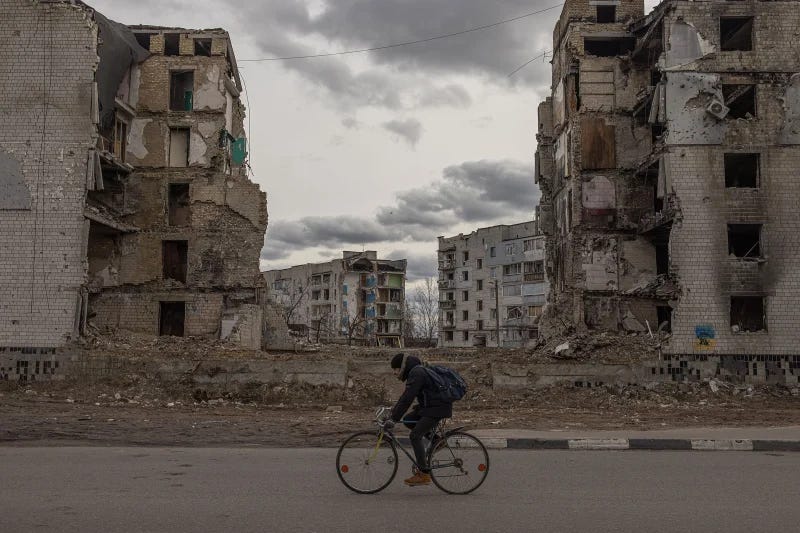Foreign Correspondence, Vol 67
How the world changed in the year since Russia's invasion of Ukraine
Hello, and happy Friday. Today marks one year since Vladimir Putin, under the pretext of revisionist history, ordered Russian soldiers to invade neighboring Ukraine in order to, as he put it, “demilitarize and denazify” the country.
One year on, the full-scale war continues. But Putin’s central aim of seizing control of Ukraine and bringing it back into Russia’s sphere of influence has been a resounding failure. The death and destruction notwithstanding, Ukrainian sovereignty and Ukrainian democracy still stands. And as was evidenced by President Joe Biden’s surprise visit to Kyiv this week, the West continues to stand with Ukraine, too.
As I’ve previously written, concerns over potential “war fatigue” have not come to pass. Biden and other Western leaders continue to assure Ukraine that it can count on their support for “as long as it takes.” But as reassuring as that message is, what Ukrainians really want is for this war to end as soon as possible.
“We really need the end and the victory to be this year,” one Ukrainian lawmaker told me in January, adding that neither Ukraine nor its allies can afford a protracted conflict. ““We can win. We just need more weapons and more air defense.”
What I’ve written
“There are decades where nothing happens,” the Bolshevik revolutionary Vladimir Lenin is thought to have said, “and there are weeks where decades happen.” While the veracity of the quote is in doubt, its premise couldn’t be more true when it comes to Russia’s full-scale invasion of Ukraine.
I wrote about some of the most significant consequences of the war so far, from the revitalization of NATO to the largest and fastest displacement of people in decades. You can read all about it here.
Plus:
What to know about Nicola Sturgeon’s shock resignation as Scotland’s leader
The biggest moments from the TIME100 Impact Awards and Gala, which I covered in Dubai
What I’ve read
This essay on the significance of Biden’s visit to Kyiv (The Atlantic)
The message today is about Ukraine itself: Despite a year of brutal war, Kyiv remains a free city; Ukraine remains a sovereign country—and this will not change. Jake Sullivan, the national-security adviser, put it like this during a press-conference call from Kyiv: “The visit today was an effort to show, and not just tell, that we will continue to stand strong.”
This conversation with Fiona Hill about why “absolute victory over Russia isn’t possible” (Unherd)
I don’t think we’re going to have an absolute victory over Russia. But look, it only ends when Russians no longer want to extend territory in an imperial fashion. Leadership matters a lot here. Boris Yeltsin and Mikhail Gorbachev didn’t have this same way of thinking. Gorbachev himself made the decision to end the Cold War; Yeltsin did not want to reincorporate Ukraine or Belarus or any of the other countries. So you’ve got to find a formula where Russia no longer wants to expand.
This piece on what Israel’s proposed judicial reforms are really about (+972 Magazine)
Many on the Israeli right view the country’s judiciary, which in reality has supported and enabled the very existence and expansion of Israeli settlements in the occupied territories, as hostile to the settler movement. They see occasional constraints the court has implemented — in particular, that it struck down a law that would have legalized settlements built on stolen private Palestinian property — as the central impediment to their ability to fulfill their annexationist dreams, which for them are a combination of messianic and ideological commandments.
What I’m thinking about
This scene outside the Russian embassy in London.
Until next time,
Yasmeen






